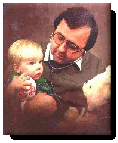If other pediatricians are like I am, one of the most common topics they discuss on the phone is fever.
Callers sometimes simply state, "My baby has a fever" or "John has a fever of 103" or "Sally has a fever again; she needs some antibiotics", as if fever were the disease.
Fever can be a problem, but not for the reasons implied in the above statements.
Many people are surprised to find that fever can be helpful in fighting off illnesses. Let's discuss some of the fact and myths about fever.
First: Fever is not an illness or disease in itself. It merely represents the body's defense mechanism to another illness.
As some bacteria and viruses produce their infections, they release compounds known as pyrogens. These substances cause the body to produce fever.
In addition, as the body's own blood cells fight off infections, they too release some similar pyrogens.
Studies have shown that the body fights off infections better, and viruses don't grow as well, at slightly higher than normal body temperatures.
Second: There is a difference between fever and temperature.
Normally, temperatures within a child range from 97.8 to 99.8 in the mouth. Rectally, it is between 98.8 and 100.8.
A temperature is not considered a fever until over 101 rectally. (101 to 102 - low grade, 103 - 104 moderate, 105 - high)
Third: The degree of fever has very little to do with the degree of illness. A higher temperature does not mean the child is more sick.
Physicians have all seen many children with 105 temperature running around playing as if nothing was wrong, and children with a low-grade fever in intensive care.
It's not the fever that counts so much as the other symptoms.
Fourth: Fever does not mean that antibiotics are needed.
In most all illnesses, even viruses, the fever is the first sign to appear. It should merely alert both parents and doctors to watch the child more closely over the next few hours/days for the development of other symptoms of illness.
If the child is seen by the doctor too soon after the onset of fever, the site of infection might not be apparent.
Therefore, if the child is over six weeks old, is fairly playful and is eating, with no other symptoms (like stiff neck, sever abdominal pains, seizure, difficulty breathing -- more than nasal congestion, etc.) it might be wise to ovse4rve for a day and allow the rest of the symptoms to develop.
If the illness is caused by a bacteria, then your physician will institute antibiotic therapy. This will not treat the fever, but will treat the underlying disease.
And fifth: Seizures are almost never caused by high fever, but rather by a temperature that goes up rapidly or comes down rapidly in a child who is prone to them.
If your child feels warm and you find that he already has 103 temperature by the time you take it, the major risk of febrile seizure has already passed.
I hope by now I have allayed most fears about fever. There are, however, some problems associated with fever.
Any newborn infant under six to eight weeks old should be seen immediately if he develops a rectal temperature greater than 101. This is because infants, as yet, have a poorly developed immunity system, and infections can spread very rapidly.
Also, fever does make a child somewhat tired, feel "sick", and sweat more. Therefore he needs more liquids to replace body fluids lost.
Some general guidelines to treat fever would be as follows:
-
The first treatment should always be to unclothe the child. Leave the child in a diaper or under shorts until the fever drops and then a light cotton sheet. The most common reason for medicines not to "work" is because the child is over bundled.
-
Medicines are best reserved for children with temperatures above 102 rectally.
-
Encourage fluids. Don't force solids or milk if a child's not interested.
-
Acetominophen (Tempra, Tylenol etc.) or aspirin can be given every four hours. Follow the dosage schedule given on the package of the particular medicine you buy. Neither medicine should be given more frequently than every four hours, and only in the correct doses.
-
If after the child's fever is unabated, sponging with lukewarm water will reduce the temperature, but may not in the long run help the child.
If the fever is unabated despite these measures, call your doctor.
If the fever persists for two to three days even though no new symptoms develop, the child should be checked in the office.
Call your doctor to be seen if you child has a seizure or is under six weeks of age with a fever.
Above all, use common sense. You know your child best. If you feel he should be checked, get medical attention. If fever is the only symptom, take appropriate action at home and see medical care as needed.
Now, be sure and check the index (menu bars above) for: other related articles on this topic: or, recently answered questions, which are sometimes more specific.
